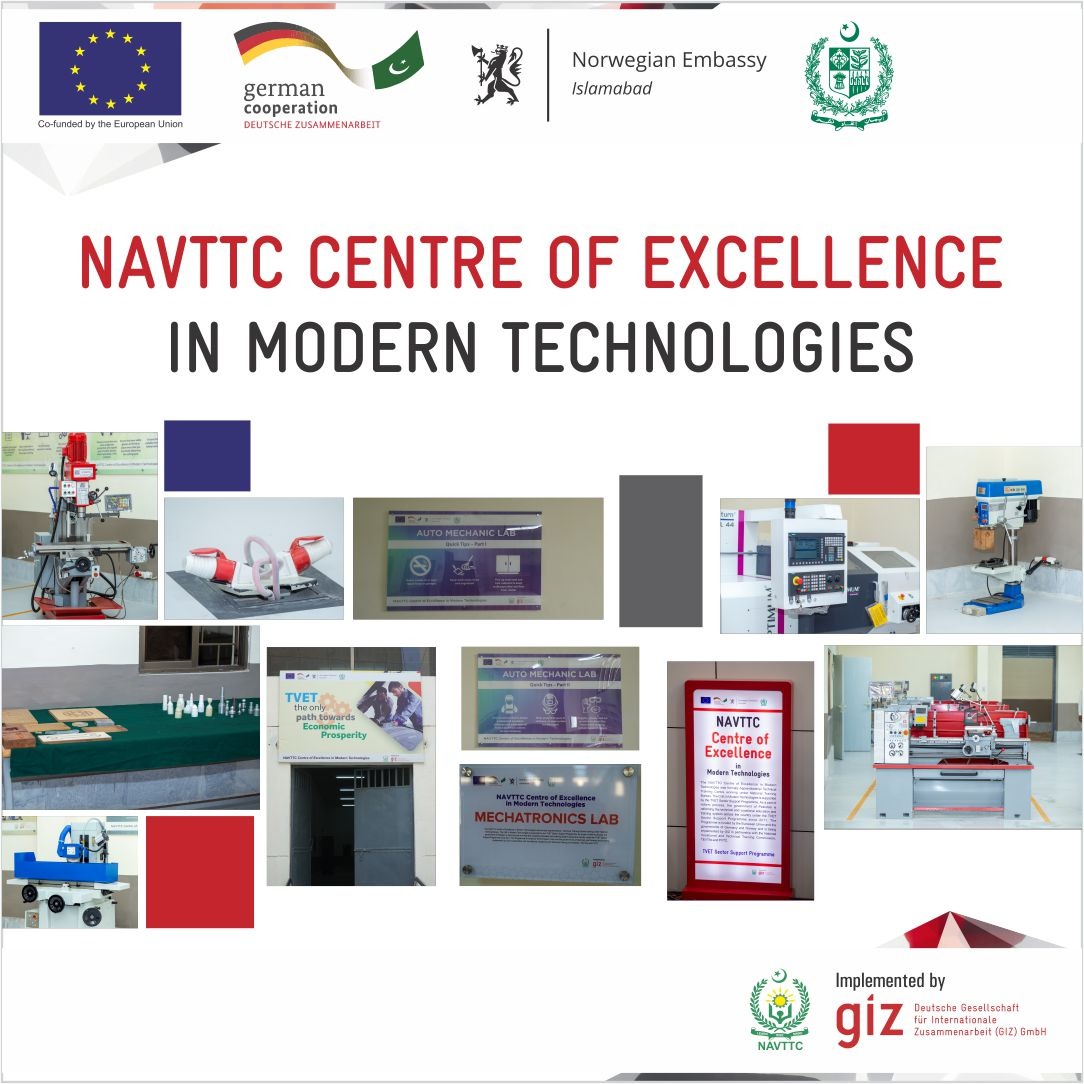
“Pakistan is one of the five most populated countries, with youth accounting for 64% of the population. Every year, over 2.2 million young graduates enter the labour market. Yet there are not enough jobs for this pool of formally educated youth. In addition to formal schooling, students require technical and vocational training that meets worldwide standards to participate in the labour market of the modern world.”
To provide well-organized and modern technical education and vocational training, the Government of Pakistan decided to bring reforms into TVET Sector in 2011. This endeavour has been supported by the European Union and the Governments of Germany and Norway through the TVET Sector Support Programme (TVET SSP). This intervention is implemented by GIZ in close collaboration with the National Vocational and Technical Training Commission (NAVTTC), Technical Education and Vocational Training Authorities (TEVTAs) and several public and private sector organisations at national and provincial levels.
One of the major interventions of TVET SSP was to establish five Centres of Excellence (CoEs). For this purpose, institutes have been selected in Islamabad, Kotri, Lahore, Hub and Peshawar. The support encompasses procurement of tools and equipment, renovation of the premises, capacity development of staff and organisational development. TVET SSP furthermore supports the engagement of the private sector in the CoEs through the establishment of Institute Management Committees (IMCs). To ensure a strong voice of potential employers is considered in decision-making, at least 50% of the members of this committee are industry representatives. Seeking to support the transition of graduates to employment, Career Counselling and Job Placement Centres (CC&JP) are to be established in each of the Centre´s. Finally, CoEs are required to use the National Vocational Qualification Framework (NVQF) registry and a digitized monitoring and evaluation system (M&E).
NAVTTC Centre of Excellence in Modern Technologies in Islamabad, is the second CoE to achieve completion. The institute was established to provide quality technical training to Islamabad Capital Territory (ICT) teachers, including Mandatory Teachers Training. It delivers principal & TVET managers training, CBT teachers and assessors training, and offers assessment for Recognition of Prior Learning (RPL).
To develop the institute into a state-of-the-art teacher and student training facility, as well as to provide knowledge-based technical services for the people of Islamabad, the centre was upgraded in terms of infrastructure, organizational development, human resource capacity building, and the introduction of demand-driven occupational training to implement a cascading training model for TVET teachers training and sequential uplift of the institute. Looking at the enhancement of the learning environment, labs for Computer Operator, Architecture Drafting, AutoCAD, Auto Mechanic, Dress Making, Electrical Technology, Fashion Designing, Mechanist, Plumbing, Solar PV Technician, and Woodwork were upgraded according to the modern world demands.
NAVTTC has demonstrated its commitment to establish the CoE Islamabad by posting internationally trained Chief Master Trainers and Master Trainers in the institute. Supported by state-of-the-art facilities, the CoE faculty is now to drive forward its continuous professional development of teachers while offering high-quality courses for students. Moreover now, the NAVTTC Centre of Excellence in Modern Technologies is ready to contribute to the improvement of TVET in ICT and hence increase the employability of youth in the region.
The state-of-the-art Centre of Excellence (CoE) in Islamabad was now inaugurated in March 2022. The NAVTTC CoE in Modern Technologies in future seeks to foster excellence in training delivery for youth and TVET practitioners through this state-of-the-art facility. The initiative will assist to grow a competent workforce with better job prospects.
In partnership with NAVTTC, the TVET Sector Support Programme since the inception of its second phase in 2017 has achieved following results:
- training of approximately 70,000 young men and women in various competency-based occupations,
- assisted national and provincial TVET authorities in recognition of prior learning of around 70,000 men and women across Pakistan,
- for human resource development of TVET officials, trained as-many-as 6,000 teachers, assessors, principals and TVET personnel,
- supported the accreditation of 335 TVET institutes,
- promoted workplace-based training and private sector led management of training
- supported establishment of 491 IMCs
- supported public-private partnership through signing of 1,600 partnerships,
- over 100 enterprises and 16 different business and industry associations were also engaged for various TVET facilitation initiatives,
- to meet the quality and industry’s demand and standards 72 different National Vocational Qualifications ranging from Level 1 to Level 4 and Level 5 are developed.
Work-based training is a powerful vehicle for developing workplace skills and promoting the productivity of the labour force. With the help and support of key players, a long distance on the TVET reforms journey has been covered and gaps have been identified. With this vision, Pakistan’s TVET Sector Support Programme’s Work-Based Training initiatives will bear tremendous results and bring Pakistan amongst the top countries on the skilled labour index.
 Pakistan TVET REFORM Support Programme Technical and Vocational Education and Training (TVET) Reform support Programme
Pakistan TVET REFORM Support Programme Technical and Vocational Education and Training (TVET) Reform support Programme








